Attached files
| file | filename |
|---|---|
| 8-K - FORM 8-K - ZIONS BANCORPORATION, NATIONAL ASSOCIATION /UT/ | form_8-k.htm |
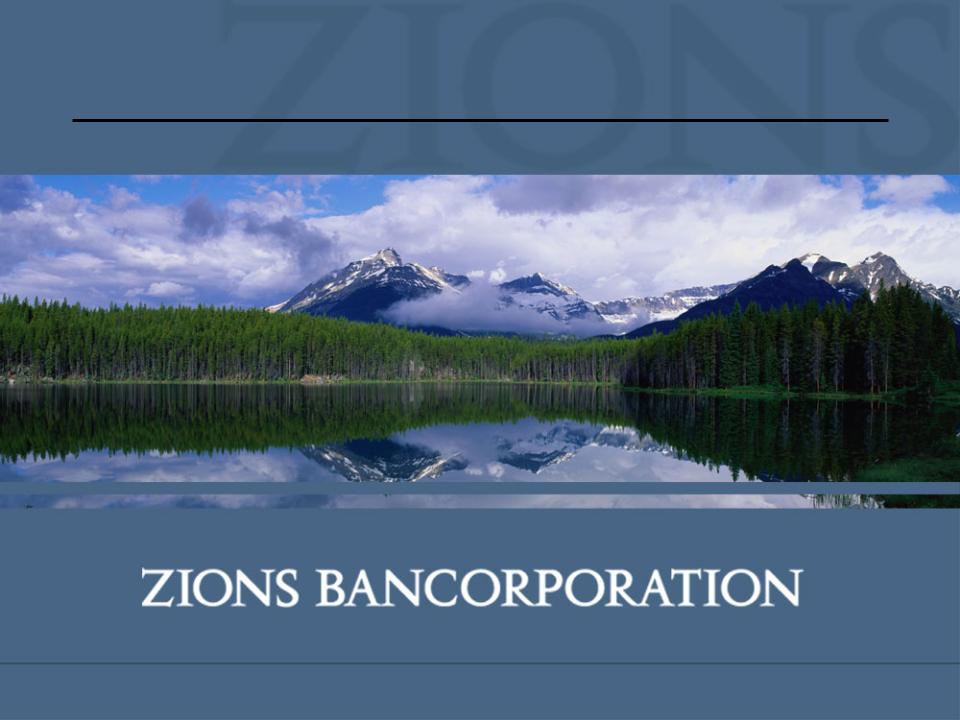
1
November 3, 2011
BancAnalysts Association of Boston
2011 Conference

2
Forward-Looking Statements
This presentation contains statements that relate to the projected performance of Zions Bancorporation
and elements of or affecting such performance, including statements with respect to the beliefs, plans,
objectives, goals, guidelines, expectations, anticipations and estimates of management. These
statements constitute forward-looking information within the meaning of the Private Securities Litigation
Reform Act. Actual facts, determinations, results or achievements may differ materially from the
statements provided in this presentation since such statements involve significant known and unknown
risks and uncertainties. Factors that might cause such differences include, but are not limited to:
competitive pressures among financial institutions; economic, market and business conditions, either
nationally or locally in areas in which Zions Bancorporation conducts its operations, being less
favorable than expected; changes in the interest rate environment reducing expected interest margins;
changes in debt, equity and securities markets; adverse legislation or regulatory changes; and other
factors described in Zions Bancorporation’s most recent annual and quarterly reports. In addition, the
statements contained in this presentation are based on facts and circumstances as understood by
management of the company on the date of this presentation, which may change in the future. Zions
Bancorporation disclaims any obligation to update any statements or to publicly announce the result of
any revisions to any of the forward-looking statements included herein to reflect future events,
developments, determinations or understandings.
and elements of or affecting such performance, including statements with respect to the beliefs, plans,
objectives, goals, guidelines, expectations, anticipations and estimates of management. These
statements constitute forward-looking information within the meaning of the Private Securities Litigation
Reform Act. Actual facts, determinations, results or achievements may differ materially from the
statements provided in this presentation since such statements involve significant known and unknown
risks and uncertainties. Factors that might cause such differences include, but are not limited to:
competitive pressures among financial institutions; economic, market and business conditions, either
nationally or locally in areas in which Zions Bancorporation conducts its operations, being less
favorable than expected; changes in the interest rate environment reducing expected interest margins;
changes in debt, equity and securities markets; adverse legislation or regulatory changes; and other
factors described in Zions Bancorporation’s most recent annual and quarterly reports. In addition, the
statements contained in this presentation are based on facts and circumstances as understood by
management of the company on the date of this presentation, which may change in the future. Zions
Bancorporation disclaims any obligation to update any statements or to publicly announce the result of
any revisions to any of the forward-looking statements included herein to reflect future events,
developments, determinations or understandings.

3
Agenda
|
Overview of Zions
Key Performance Drivers
–Capital
–Revenue
–Credit Quality
Outlook Summary
|
|
|

4
A Collection of Great Banks
Asset and deposit balances as of 3Q 2011
§ $51.5 billion in assets as of 9/30/2011
§ $3.1 billion market capitalization as of 11/1/2011

5
Multi-Bank Model Competitive Strengths
§ Superior lending capacity relative to community banks
§ Superior local customer access to bank decision makers relative to
big nationals
big nationals
§ Sharing best practices among banks
– CEOs & division managers meet frequently
§ Community bank feel - local marketing and branding
§ Centralization of processing and other non-customer facing elements
of the business
of the business
§ Established market-leading small business lender
– Leading SBA and small business lender
– Superior treasury management products & services (Greenwich survey)
§ Strategic local “ownership” of market opportunities and challenges

6
Small Business Banking:
National Awards:
• Overall Satisfaction
• Overall Treasury Management
Regional Awards:
• Overall Satisfaction - West
• Overall Satisfaction - Treasury Management - West
What Others Say About Us
2010 Greenwich Excellence Awards
in Small Business and Middle Market Banking
Middle Market Banking
National Awards:
• Overall Satisfaction
• Relationship Manager Performance
• Credit Policy
• Overall Treasury Management
• Accuracy of Operations
• Customer Service
• Treasury Product Capabilities
• Treasury Sales Specialist Performance
Regional Awards:
• Overall Satisfaction - West
• Overall Satisfaction - Treasury Management - West

7
*Includes home equity, construction and other consumer real estate, bankcard and other revolving plans, FDIC and other loan types.
Strong Focus on Business Banking - Loan Mix
Loan Portfolio as of
3Q11
3Q11
§Commercial and CRE
Loans: 79%
Loans: 79%
§Retail & Other Loans:
21%
21%
Change in portfolio composition since December 2007

8
Agenda
|
Overview of Zions
Key Performance Drivers
–Capital
–Revenue
–Credit Quality
Outlook Summary
|
|
|
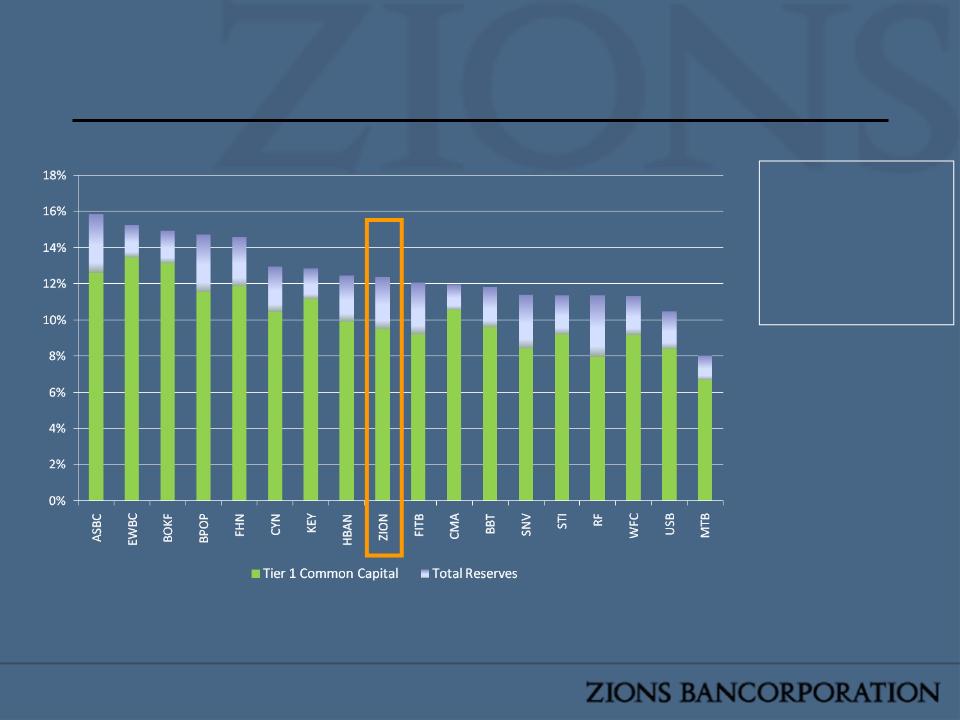
9
Tier 1 Common + Reserves as a Percentage of Risk-Weighted Assets
Note: Peer group includes U.S. regional banks with assets greater than $20 billion and less than $200 billion plus footprint competitors WFC and USB.
Reserves include loan loss reserve plus reserve for unfunded lending commitments.
Source: Zions , company documents as of 3Q11; Peers, SNL as of 2Q11.
Capital Ratios as of 3Q11:
§Tier 1 Common: 9.5%
§Tier 1 Risk-Based: 16.0%
§Total Risk-Based: 18.0%

10
Comparatively Stronger Loan Loss Coverage
Source: Zions , company documents as of 3Q11; Peers, SNL as of 2Q11.
Annualized charge-off ratio. Reserves include loan loss reserve plus reserve for unfunded lending commitments.

11
Capital Structure Cost Savings Opportunities:
2011-2015
|
Targeted Capital Issue - Repayment or Refinance
($ in millions, except per share figures)
|
Earliest Call or
Maturity Date |
AFTER-
Tax Rate |
Marginal
Savings to EPS |
Cumulative
Savings to EPS |
Cumulative
Principal Outstanding |
|
Series D Preferred Stock (TARP ~6.7% rate,
including warrant accretion) |
To Be
Determined |
6.7%
|
$0.50
|
$0.50
|
$1,400
|
|
Series B Trust Preferred (8.0% rate)
|
Currently
Callable @ Par |
4.9%
|
$0.08
|
$0.58
|
$1,694
|
|
Series E Preferred Stock (11.0% rate)
|
15 Jun 2012 @
Par |
11.0%
|
$0.09
|
$0.66
|
$1,836
|
|
Series C Preferred Stock (9.5% rate)
|
15 Sep 2013 @
Par |
9.5%
|
$0.36
|
$1.02
|
$2,530
|
|
Convertible Subordinated Debt - 5.65% May 2014
|
15 May 2014
(maturity) |
15.8%
|
$0.07
|
$1.10
|
$2,670
|
|
Convertible Subordinated Debt - 6.0% Sep 2015
|
15 Sep 2015
(maturity) |
14.5%
|
$0.10
|
$1.20
|
$2,900
|
|
Convertible Subordinated Debt - 5.5% Nov 2015
|
16 Nov 2015
(maturity) |
13.2%
|
$0.08
|
$1.28
|
$3,093
|
§ Significant repayment and/or refinancing opportunities on the horizon. The table
below assumes full repayment to illustrate potential cost savings.
below assumes full repayment to illustrate potential cost savings.
§ All amounts as of 3Q 2011; Sub debt after-tax rates are high due to the significant difference between book value and par, as well as the non-cash regular
discount accretion. The table above does NOT include the effect of “accelerated” amortization expense, which occurs upon conversion. May not sum due to
rounding.
discount accretion. The table above does NOT include the effect of “accelerated” amortization expense, which occurs upon conversion. May not sum due to
rounding.

12
CCAR and TARP Repayment
§ Zions expects to be part of the CCAR 2011 Federal Reserve stress
test process
test process
§ Capital plans and stress tests submitted are expected to frame
capital actions for 2012, as they did for the 19 largest banks in 2011
capital actions for 2012, as they did for the 19 largest banks in 2011
§ Therefore, Zions does not expect to repay TARP until sometime after
completion of the CCAR process
completion of the CCAR process
CCAR: Comprehensive Capital Analysis and Review

13
Agenda
|
Overview of Zions
Key Performance Drivers
–Capital
–Revenue
–Credit Quality
Outlook Summary
|
|
|

14
Loan Growth Trend
Excludes Construction and FDIC-supported Loans
Excludes Construction and FDIC-supported Loans
Source: Company earnings releases
Excludes construction loans to both commercial and consumer borrowers

15
Core Net Interest Margin
Zions’ net interest margin excludes non-cash sub debt amortization expense and accretion on FDIC-acquired loans. Peer group net interest margin adjusted for accretion of interest income on
FDIC acquired loans, where applicable.
FDIC acquired loans, where applicable.
Source: Zions , company documents as of 3Q11; Peers, SNL and 10-Qs as of 2Q11.
Strong NIM
Driven in part by Strong Demand
Deposits
Deposits

16
Core NIM Trends
§ Zions expects net interest sensitive
income to increase between an
estimated 6.2% and 9.4% if interest
rates were to rise 200 bps* in the first
year
income to increase between an
estimated 6.2% and 9.4% if interest
rates were to rise 200 bps* in the first
year
§ Core NIM (excludes discount accretion)
has been generally stable
has been generally stable
– 2010 core NIM compression attributable to
a greater drag from cash balances
a greater drag from cash balances
– 1Q09 experienced a temporary dip partially
due to an intentional build-up of excess
liquidity during the significant turmoil during
late 2008/early 2009
due to an intentional build-up of excess
liquidity during the significant turmoil during
late 2008/early 2009
– Large senior note issuance in September
2009 had about 8 bps adverse impact on
the core NIM in 4Q09
2009 had about 8 bps adverse impact on
the core NIM in 4Q09
(1) Cash drag refers to the adverse impact on the net interest margin due to the total balance of cash held in interest-bearing accounts. Assumptions used to compute the cash drag include
investing the cash at a rate of 4.5%, similar to the rate achieved on recent loan production. Liquidity targets and loan demand are factors that may prevent fully deploying such cash; the cash
drag is shown for illustrative purposes only.
investing the cash at a rate of 4.5%, similar to the rate achieved on recent loan production. Liquidity targets and loan demand are factors that may prevent fully deploying such cash; the cash
drag is shown for illustrative purposes only.
*Assumes a parallel shift in the yield curve; key assumptions include a slow and a fast deposit repricing response (i.e. if deposit rates are slow to increase Zions expects a 9.4% increase in
interest sensitive income, and if deposits were to reprice quickly Zions expects a 6.2% increase in interest sensitive income); sensitivity analysis based on September 2011 data. Also
assumes $6.4 billion of DDA and interest-on-checking deposits are replaced with market rate funds.
interest sensitive income, and if deposits were to reprice quickly Zions expects a 6.2% increase in interest sensitive income); sensitivity analysis based on September 2011 data. Also
assumes $6.4 billion of DDA and interest-on-checking deposits are replaced with market rate funds.
Due to the extinguishment/ reissuance of subordinated debt in June 2009, Zions experiences non-cash discount accretion, which increases interest expense, reducing GAAP NIM
|
|
2009
|
2010
|
2011
|
||||||||
|
|
1Q
|
2Q
|
3Q
|
4Q
|
1Q
|
2Q
|
3Q
|
4Q
|
1Q
|
2Q
|
3Q
|
|
Cash Drag (1)
|
24
bps |
17
bps |
16
bps |
24
bps |
20
bps |
35
bps |
46
bps |
45
bps |
41
bps |
43
bps |
50
bps |

17
Loans with Floors
As of 2Q 2011
As of 2Q 2011
§ Floors on loans added ~22
basis points to the NIM in
2Q11
basis points to the NIM in
2Q11
§ The benefit to NIM declined
~3 basis points during 1H11
~3 basis points during 1H11
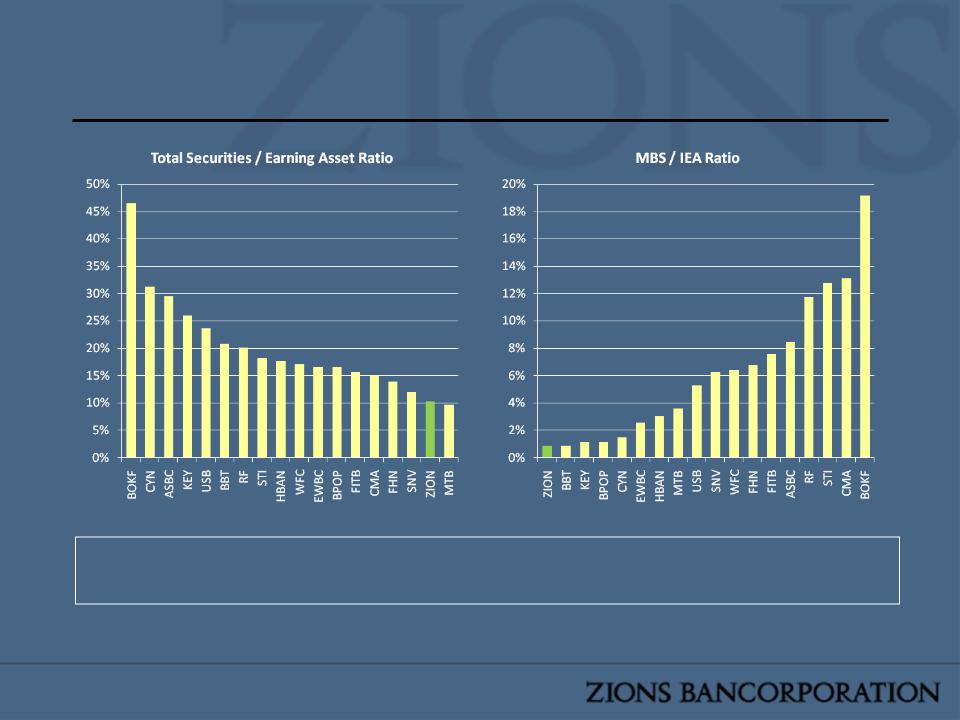
18
Securities Portfolio Comparison
Source: Zions, company documents as of 3Q11; Peers, SNL as of 2Q11
MBS securities include residential mortgage pass-through investments that are not guaranteed by the U.S. Government
§ Estimated option-adjusted duration of loan portfolio = 1.3 years
§ Estimated option-adjusted duration of securities portfolio = 0.8 years

19
Interest Rate Risk Simulation - “Slow Response”
§ Assumes a 36% ($5.4 billion) attrition of non-interest bearing balances and a 12% ($0.8 billion) attrition of savings and NOW balances, with
such funding replaced using simulated market rate funds.
such funding replaced using simulated market rate funds.
§ 12-month simulated impact using a static balance sheet and a parallel shift in the yield curve, and is based on regression analysis
comparing deposit repricing changes against similar duration benchmark indices (e.g. Libor, U.S. Treasuries); it also includes management
input across all major geographies in which Zions does business, intended to adjust for local market conditions(1).
comparing deposit repricing changes against similar duration benchmark indices (e.g. Libor, U.S. Treasuries); it also includes management
input across all major geographies in which Zions does business, intended to adjust for local market conditions(1).
(1) “Slow Response” refers to an assumption that market rates on deposits will adjust at a moderate rate (i.e. supply of deposits exceeds demand for
loans); data as of September 30, 2011
loans); data as of September 30, 2011

20
Drivers of Core Net Interest Margin
|
Drivers of Core NIM Stability /
Expansion |
Drivers of NIM Contraction
|
|
§ Reduce deposit cost by product
|
§ Modest Loan Yield Compression
– Recent compression primarily driven by:
• more competitive loan pricing and
• reduced presence of loan floors
– Recent yield compression has been
approximately 5 bps per quarter |
|
§ Emphasize deposit mix shift to DDA away from
CDs |
|
|
§ De minimus exposure to securities with
refinancing risk (e.g. MBS) |
|
|
§ Modest loan growth
– Each $100 million of loan growth equals ~ 1
bp expansion of NIM |
|
|
§ Asset quality improvement
|
|
|
§ Lesser amounts of expensive sub debt if/as
conversions (to preferred stock) occur |
§ Surplus flow of deposits rolling into cash
– Slightly positive for net interest income, but
dilutive to the core NIM |

21
Core net income excludes items that are one time or non-recurring in nature. 2Q09 - 4Q09 included material gains from loan portfolio related interest rate swaps. Swaps are used to
manage interest rate risk and were generally added near the peak in the rate cycle. As hedges became ineffective, gains were realized.
manage interest rate risk and were generally added near the peak in the rate cycle. As hedges became ineffective, gains were realized.
Core Pre-Tax, Pre-Credit Income
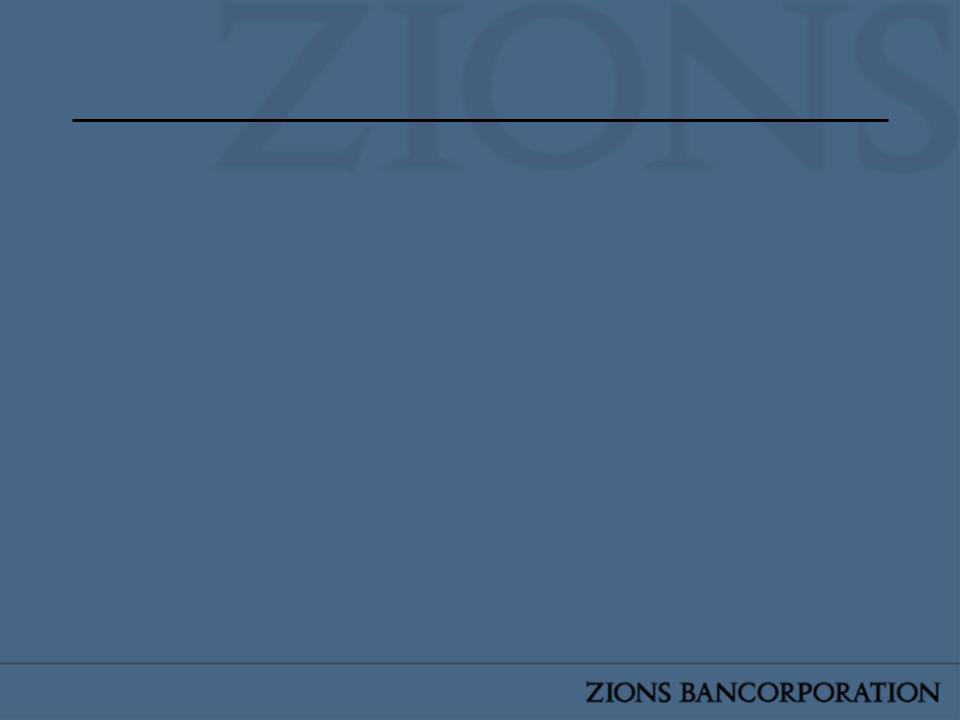
22
Agenda
|
Overview of Zions
Key Performance Drivers
–Capital
–Revenue
–Credit Quality
Outlook Summary
|
|
|

23
Credit Quality Trends
*Annualized
Note: Peer group includes U.S. publicly traded regional banks with assets greater than $20 billion and less than $200 billion plus footprint competitors WFC and USB
Source: SNL
Nonperforming assets as a %
of Loans & OREO
of Loans & OREO
Net Charge-offs as
a % of Loans*
a % of Loans*
4.56%
3.43%
1.29%
1.11%

24
Nonaccrual Loan Inflows
Millions
Source: Company documents

25
Problem Credit Resolution Trends
Source: Company documents
Note: Charts reflect problem credits that were $50k or greater in size; “Favorable” resolutions include loans changed to accrual status, loans paid down/paid off, or proceeds from real estate
sales. Unfavorable resolutions include increases in balance, charge-offs, charge-downs, and valuation allowances on property held in REO. NPAs are grossed-up for new nonaccrual loan
inflows during the quarters.
sales. Unfavorable resolutions include increases in balance, charge-offs, charge-downs, and valuation allowances on property held in REO. NPAs are grossed-up for new nonaccrual loan
inflows during the quarters.

26
Great Recession 3 Year Cumulative Net Charge-Off Comparison
Note: Peer group includes U.S. publicly traded regional banks with assets greater than $20 billion and less than $200 billion plus footprint competitors WFC and USB
Source: SNL regulatory data; Years 2008 thru 2010.

27
Term CRE
Updated LTV Stratification
Updated LTV Stratification
The NCREIF Property Index is a national index that has been applied to Zions’ mostly regional CRE Portfolio
Zions loan data as of 3Q11; NCREIF Index as of 2Q11
|
Percentage of Loans within each bucket that are Nonaccrual
|
||||||
|
0.6%
|
2.8%
|
1.6%
|
3.6%
|
14.7%
|
10.0%
|
7.3%
|
§ By attaching each loan to the
NCREIF Property Index as of the
date of the loans’ last appraisal we
can see an estimate of the updated
LTV ratios of the portfolio
NCREIF Property Index as of the
date of the loans’ last appraisal we
can see an estimate of the updated
LTV ratios of the portfolio

28
Lessons Learned, Changes Made
§ Significant enhancement to credit administrative staff
– Chief Credit Administrators:
• C&I
• CRE
• Consumer
– Concentration Risk Manager
– Data Quality Assurance
– Enhanced Systems
– Training
§ Concentration Limits
§ Implementing Additional Early Warning Indicators
§ Comprehensive Stress Testing

29
Agenda
|
Overview of Zions
Key Performance Drivers
–Capital
–Credit Quality
–Revenue
Outlook Summary
|
|
|
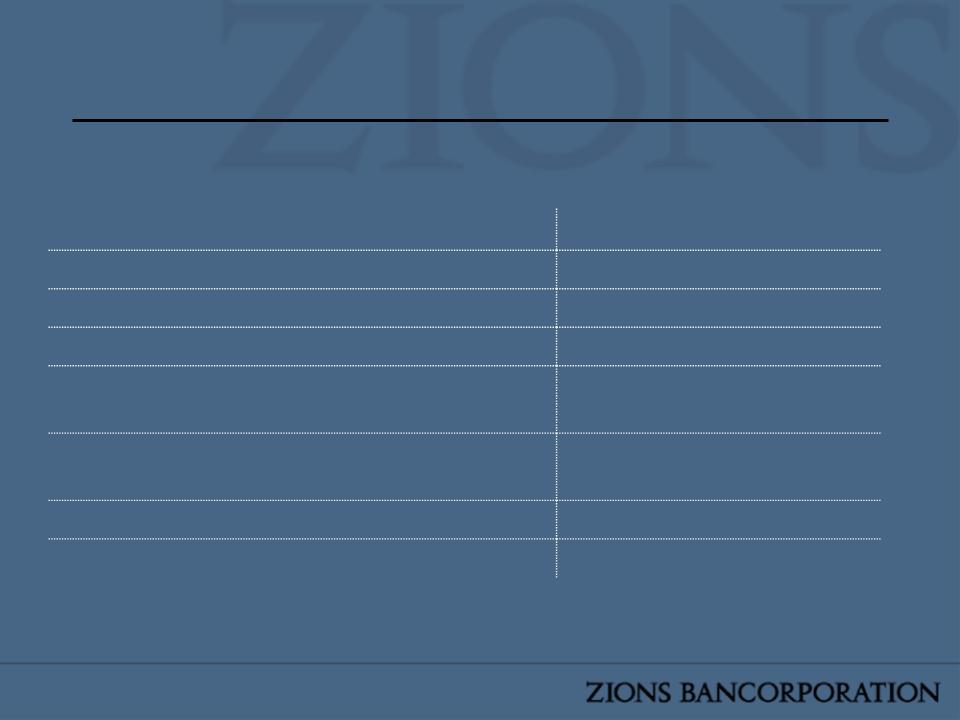
30
Outlook Summary
|
Topic
|
Outlook
|
|
Loan Balances
|
Stable to Moderately Higher
|
|
Credit Trends
|
Improving
|
|
Core Net Interest Income
|
Stable to Moderately Higher
|
|
Core Noninterest Income
|
Moderately Declining
(Durbin Impact)
|
|
Core Noninterest Expense, excluding Credit-
Related NIE |
Slightly Higher
|
|
Credit-Related Noninterest Expense
|
Declining
|
|
Risk-Based Capital Ratios
|
Improving
|

31
Appendix

32
Source: Company 3Q11 earnings press release
Trends: Nonaccrual and Net Charge-Offs
Construction & Land Development
Construction & Land Development

33
Source: Company 3Q11 earnings press release
Trends: Nonaccrual and Net Charge-Offs
Term CRE & Owner Occupied
Term CRE & Owner Occupied

34
